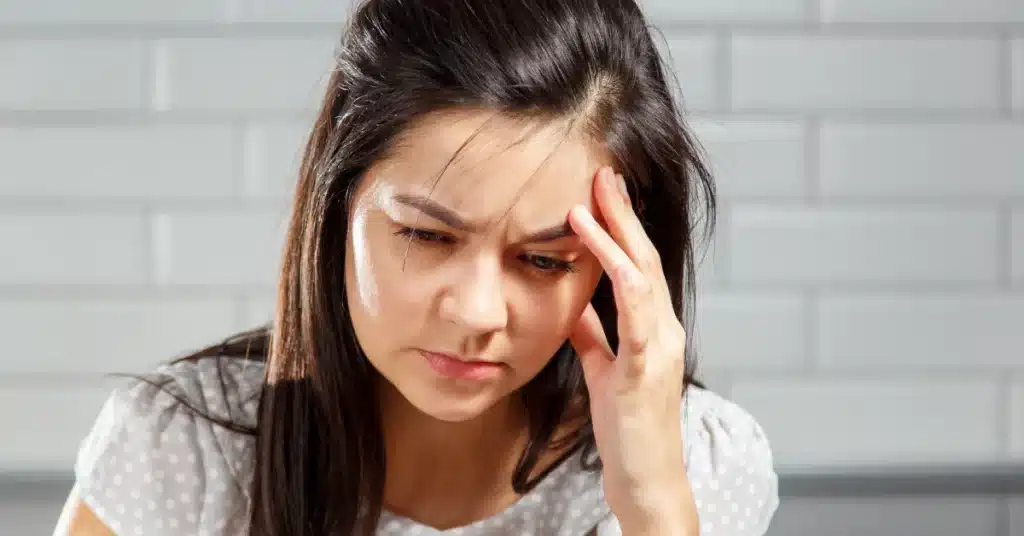Discovering the Roots of My Monthly PMS Triggers
Why does PMS sometimes hit so hard?
I frequently wondered why my Premenstrual Syndrome (PMS) is so severe.
It’s a time when my emotions run high, and my body feels constantly discomforted.
I craved all the unhealthy foods and had PMS bloating, irritation, and exhaustion.
I didn’t grasp my body’s changes when I was younger and felt I was the only one.
However, as I got older and talked to friends and relatives, I understood that many women get PMS.
My PMS story consists of a monthly struggle that I have learned to manage over the years.
In this article, I discuss the several causes of PMS based on my monthly PMS triggers and share how I manage my period symptoms.
My personal experience with PMS causes

There are various causes of PMS symptoms, and it’s different for every woman.
Here are some reasons, mostly lifestyle factors, that contributed to my monthly PMS triggers:
Hormonal fluctuations
It all starts with hormones.
Hormonal changes during the menstrual cycle caused my PMS symptoms as they do to most women.
During my menstrual cycle, these changes affect my body’s levels of Estrogen and Progesterone.
The fluctuating hormones lead to PMS mood swings, bloating, and fatigue.
It’s like a hormonal dance that my body can’t avoid.
Stress takes its toll

My stress is a sneaky culprit.
I learned that when I’m stressed, my cortisol levels skyrocket, disrupting the hormonal balance and amplifying PMS symptoms.
Emotional stress can intensify physical symptoms and worsen existing conditions.
Learning to manage stress has been a game-changer for me.
Poor diet
Everything I eat plays a significant role in my monthly PMS struggle.
Craving sweets like there’s no tomorrow?
Blame it on fluctuating blood sugar levels.
Incorporating balanced meals and healthy snacks has helped curb those PMS cravings.
I realized my salt intake is a factor behind my monthly PMS struggle, too.
Consuming too much salt worsened my fluid retention and bloating.
I consciously try eating a balanced diet.
Eating nutrient-rich foods, particularly those high in magnesium, calcium, vitamin B6, and omega-3 fatty acids, ease my symptoms.
Sleepless nights
Ah, sleep – the elusive remedy for many woes.
During PMS, sleep disturbances are common due to hormonal changes and discomfort.
My lack of sleep turned into PMS insomnia for a few days before my period.
Forming a soothing bedtime routine and maintaining a regular sleep schedule has improved my sleep quality.
Getting enough restful sleep each night supports hormonal health and improves mood.
Lack of exercise
My lifestyle choices have a huge contribution to the intensity of PMS symptoms.
Lack of exercise? Check.
Poor hydration? Guilty.
Making small but impactful changes like staying active and hydrated has made a noticeable difference.
Physical activity helps regulate hormonal balance and improve overall well-being.
It releases Endorphins, which boost my mood and energy levels.
Other potential causes
Apart from the reasons behind my monthly PMS triggers, many other factors can cause it in other women.
Some other factors apart from habits that may worsen PMS include:
- Genetics: Family history can also play a role in PMS. If your mother or sister has PMS, you may be more likely to experience it, too
- Mental health: Anxiety and Depression can also worsen PMS symptoms. Protect your psychological health and seek help if you need it for PMS-related anxiety
- Low Serotonin: A drop in this neurotransmitter may contribute to Depression and Anxiety before menstruation
When I decided it was time to talk to a doctor
Sometimes, despite my best efforts to implement natural remedies for PMS and lifestyle adjustments, PMS symptoms persist.
That’s when I knew it was time to seek professional help for my monthly PMS triggers.
Talking to my doctor opened up a world of PMS treatment options and personalized advice tailored to my needs.
If your PMS symptoms are severe and affecting your daily life, it’s important to talk to your doctor.
Your doctor may recommend PMS medications, or supplements, to help reduce PMS symptoms.
Also, speaking from experience, surrounding ourselves with empathetic friends and family members helps a lot.
Key takeaways
- The causes of PMS can vary from person to person and include hormonal changes, lifestyle factors, genetics, and mental health
- Fluctuations in Estrogen and Progesterone levels contribute to PMS symptoms
- Low Serotonin levels may result in increased Depression and Anxiety
- High salt consumption leads to water retention and bloating
- Stress amplifies PMS symptoms
- Natural remedies such as exercise, diet, supplements, and self-care can help reduce PMS symptoms
- Severe symptoms warrant consultation with a healthcare provider
WowRx uses only high-quality sources while writing our articles. Please read our content information policy to know more about how we keep our content reliable and trustworthy.



